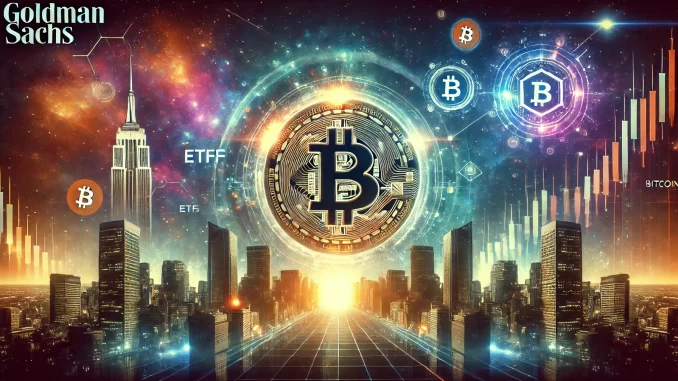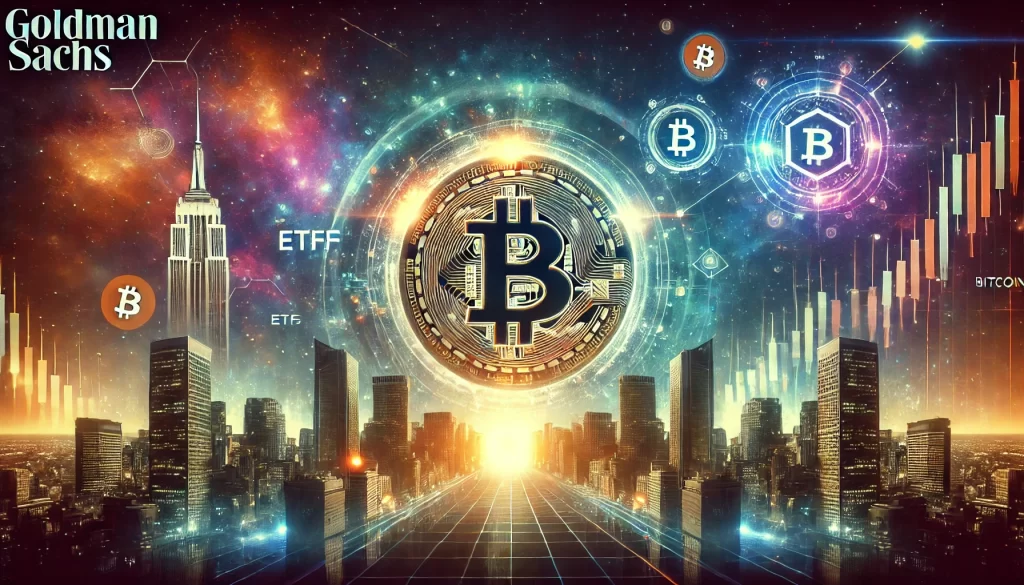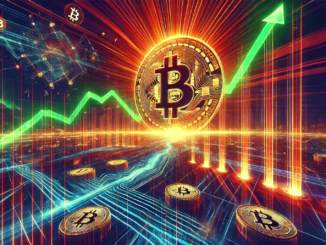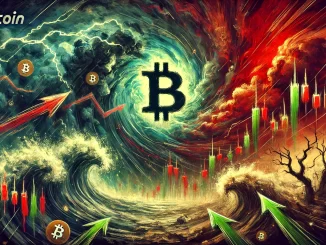
Table of Contents

Introduction: Increasingly Interest in Bitcoin ETFs Goldman Sachs
One of the top worldwide investment banks, Goldman Sachs is making notable advancements in the bitcoin market. A recent 13F disclosure claims that Goldman Sachs now owns more than $400 million in Bitcoin ETFs—exchange-traded funds. For the bank, which earlier voiced doubt about digital assets, this represents a significant change. We investigate Goldman Sachs’s present holdings, strategic development into crypto tokenization, and effects for the larger financial market in this paper.
Extensive Bitcoin ETF Holdings of Goldman Sachs
According to the 13F filing, Goldman Sachs owns seven of the eleven Bitcoin ETFs accessible in the United States. Valued at almost $238.6 million, the iShares Bitcoin Trust (IBIT) holds the biggest of these interests. Fidelity’s Bitcoin ETF (FBTC) at $79.5 million, Invesco Galaxy’s BTC ETF (BTCO) at $56.1 million, and Grayscale’s GBTC at $35.1 million follow here. The bank also holds lesser interests in BITB, BTCW, and ARKB. These large expenditures show Goldman Sachs’s increasing faith in the transforming financial tool potential of Bitcoin ETFs.
With daily inflow of $4.39 million, Bitcoin ETF flows stayed positive on a recent U.S. trading day, according to SoSoValue. This ongoing flow points to growing institutional trust in Bitcoin ETFs. Mathew McDermott, Goldman Sachs’ worldwide head of digital assets, said Bitcoin ETFs were a “big psychological turning point” for the sector during CoinDesk’s Consensus 2024 festival, stressing their success and the possibility for even more expansion in this field.
Strategic Change of Goldman Sachs Towards Tokenization of Crypto
Apart from its investments in Bitcoin ETF, Goldman Sachs is apparently increasing its presence in the crypto market by introducing three tokenized funds by year end. For the 150-year-old bank, this action marks a strategic change as it seeks to profit on the rising asset tokenizing trend. One of these monies allegedly will go toward the U.S. fund sector, while another will concentrate on European debt markets. The bank also intends to establish markets for tokenized assets, so complementing itself with rivals including BlackRock, Franklin Templeton, and Fidelity, who have also entered the tokenizing of actual assets.
The shift into tokenization helps Goldman Sachs to match other big financial companies who view blockchain technology as the direction of finance. BlackRock, for example, recently topped $500 million in market value with its blockchain-powered treasury product, BUIDL. Likewise, on the Stellar and Polygon blockchains Franklin Templeton has unveiled an on-chain fund and the associated BENJI token. Additionally tokenized by Fidelity International are money market fund shares. These advances point to a more general industry trend toward including blockchain technology into conventional banking.
The cautious approach of Goldman Sachs toward blockchain networks
Goldman Sachs is wary about fully embracing distributed blockchains like Ethereum even if it is dipping into cryptocurrencies. Concerns about regulations have driven the bank mostly toward permissioned blockchain systems. As Goldman Sachs negotiates the changing regulatory scene, this strategy distinguishes the bank from some of its rivals and reflects its focus on compliance and risk management.
McDermott’s Vision for Digital Change
Key proponent of digital transformation at Goldman Sachs, Mathew McDermott has been especially helpful in guiding the bank into digital assets. McDermott has been spearheading initiatives to create digital asset desk for Goldman Sachs and introduce cash-settled crypto derivative trading products since 2021. His vision runs counter to that of Goldman Sachs’s Wealth Management Chief Investment Officer, Sharmin Mossavar-Rahmani, who has voiced doubts about client crypto demand.
Projects on Tokenization by Goldman Sachs: Future Directions
Already making major advances in the tokenization space, Goldman Sachs issued bonds with the European Investment Bank and tokenized a sovereign green bond for the Hong Kong Monetary Authority. These projects highlight the bank’s will to apply blockchain technology for financial innovation. Goldman Sachs should keep an eye on how its tokenizing initiatives affect the larger financial market and the acceptance of digital assets as it keeps developing them.
Conclusion: Growing Influence of Goldman Sachs in the Crypto Ecosystem
Goldman Sachs’s plans to introduce tokenized funds and large investment in Bitcoin ETFs point to a significant change in the bank’s attitude to digital assets. Goldman Sachs, one of the most powerful financial institutions in the world, could have major effects on the acceptance of cryptocurrencies going forward and the incorporation of blockchain technology into conventional finance based on their activities. The financial sector will be closely observing the bank’s policies and innovations as it keeps negotiating this new frontiers.
Disclaimer
This is just meant to be information; it is not financial or investment advise. Unexpected changes in market conditions mean that before making any financial decisions, one must carefully study and consult a professional.
For further insights, visit our cryptocurrency website
Explore more about [Bitcoin’s price movements and market trends]







Be the first to comment